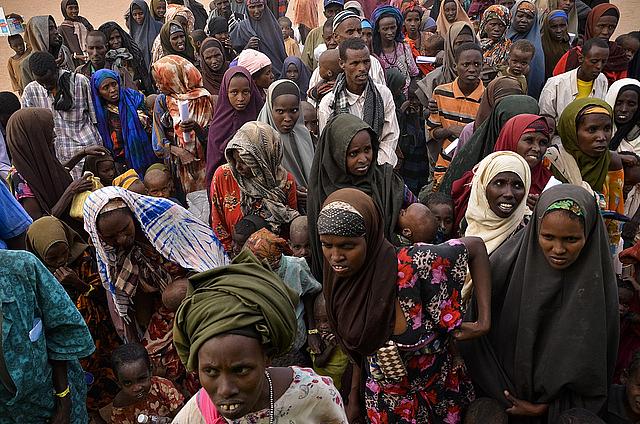The Politics of Health: Ideas for covering a famine

The U.N. World Food Program reports that 13 million people have been affected by famine in the Horn of Africa. 1,600 Somali refugees pour into Kenya and another 200 into Ethiopia every day.
Charles Kenny described the effects of hunger and the extent of the disaster in Foreign Policy:
Deprived of food long enough, the bodies of starving people break down muscle tissue to keep vital organs functioning. Diarrhea and skin rashes are common, as are fungal and other infections. As the stomach wastes away, the perception of hunger is reduced and lethargy sets in. Movement becomes immensely painful. Often it is dehydration that finally causes death, because the perception of thirst and a starving person's ability to get water are both radically diminished.
This kind of preventable devastation, Kenny argues, amounts to a crime against humanity. I would argue that it's a huge health story and, as aid agencies told The New York Times last week, it's one that has taken too long to get into the headlines.
In July, when the United Nations officially declared that the situation in East Africa is indeed a famine, David Dickson at SciDev.Net explained the gap between science and the humanitarian response. The famine was no surprise to the agencies that had been tracking drought conditions, but aid was slow to follow. Politicians should have taken action, Dickson wrote, but "journalists too need to engage politicians much better when reporting the scientific aspects of disasters to help ensure that timely action is taken."
Here's an example of the importance of politics to a health journalist: Outbreaks of cholera and measles are difficult to address because a functioning state needs to manage sanitation or create conditions where a private company will invest in providing the service. Kenny, who is the author of Getting Better: Why Global Development Is Succeeding and How We Can Improve the World Even More, told Career GPS in an email that one appeal he would make to journalists is that they "should look beyond the emaciated faces and dusty fields to ask 'what turned an act of nature into this catastrophe?'" He wrote that "if health journailsts are interested in the root cause of illness, the root cause of starvation in famine is political":
The story with famine is always more complex than too little rain or too little donor money -- much though both rain and donor support are really important. At the same time, there is the fear of going to the extreme that journalist Linda Polman reached in her recent book The Crisis Caravan: What's Wrong with Humanitarian Aid?. She effectively argues that humanitarain assistance just ends supporting the warlords who created that crisis in the first place. She doesn't have the evidence to back up her contention that humanitarian assistance does more harm than good --I'm convinced that for all of the diversion of funds and waste, it saves lives. But famines are horrible events that necessary involve some evil people (not misguided, not incompetent --evil) in positions of power. Aid organizations usually have to deal with those same people if they are to deliver help. That's a complex but vital point to get across to readers. Delivery will involve waste, inefficiency, and morally questionable decisions -- but assistance is vitally needed and can work.
Edward Carr, an associate professor in the Department of Geography at the University of South Carolina serving as a coordinator at the United States Agency for International Development (USAID), writes a personal blog called Open the Echo Chamber. In July he made this admonition to the media:
After reading a lot of news and blog posts on the situation in the Horn of Africa, I feel the need to make something clear: the drought in the Horn of Africa is not the cause of the famine we are seeing take shape in southern Somalia. We are being pounded by a narrative of this famine that more or less points to the failure of seasonal rains as its cause . . . which I see as a horrible abdication of responsibility for the human causes of this tragedy.
He continues the post with suggestions for background reading and a bit of optimism:
We can't blame this famine on the weather – we need to be looking at everything from local and national politics that shape access and entitlements to food to global food markets that have driven the price of needed staples up across the world, thus curtailing access for the poorest. The bad news: Humans caused this. The good news: If we caused it, we can prevent the next one.
Global health journalist Samuel Loewenberg told Career GPS about the challenges covering impending famine in Niger in 2005. His essay about famine and the power of the media in the Lancet last summer resonates now:
The lack of media attention is directly related to the amount of focus, and funds, that rich governments put towards a crisis, say aid agencies, who term it 'the CNN effect'. In 2005, the food emergency was virtually ignored until it reached a peak in July as children began starving to death. After footage from the BBC was broadcast in the UK and the USA, millions of dollars began streaming in. Until then, despite more than six months of appeals, the only aid was a small grant from Luxembourg.
(Photo: "Information Assessment in Dadaab" taken on Aug. 7, 2011 by InterNews Network, via Flickr Creative Commons)

